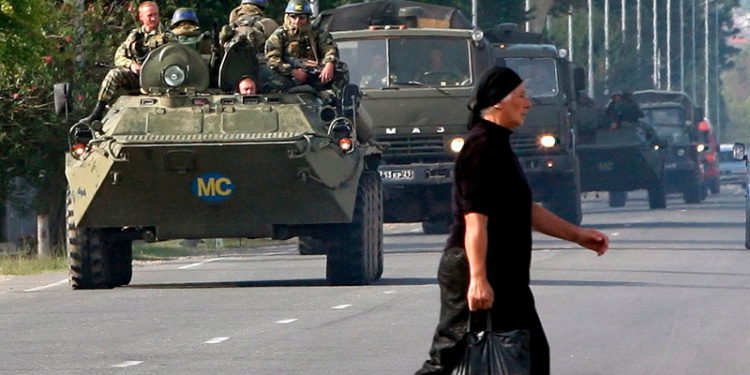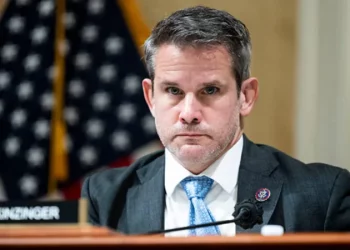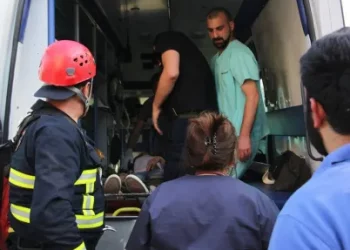The Ministry of Foreign Affairs of Georgia has released a statement on the 13th anniversary of the August 2008 war. The agency emphasizes the actions that the Russian Federation has taken and is taking towards Georgia, underlines the decision of the Strasbourg court regarding the war and calls on Moscow to fulfill its obligations under the August 12, 2008 agreement.
“The Ministry of Foreign Affairs of Georgia calls on the Russian Federation to respect the fundamental principles of international law and fulfill its obligations under the ceasefire agreement of 12 August 2008, to withdraw the occupation forces from the territory of Georgia, to abolish the illegal decision of recognition of the so-called “independence” of occupied territories and allow the deployment of international security mechanisms on the ground,” reads the statement.
“Today marks 13th years since Russia’s military aggression against Georgia, occupation of Georgian regions. Russia must fulfill the ceasefire agreement,” Georgian Foreign Minister Davit Zalkaliani wrote on Twitter.
“Recently European Court of Human Rights ruled its verdict on Russia-Georgia conflict and found Russian Federation exercising effective control responsible for human rights violations in August 2008 War. Russia must fulfill the ceasefire agreement,” wrote Zalkaliani.
2day marks 13th years since Russia's military aggression against #Georgia & #occupation of GeoReg's. Recently @ECHR_CEDH ruled its verdict on #RusGeoConflict &found RF exercising effective control responsible 4HR violations in #Aug2008War.
⚠️RUS must fulfil #CeasefireAgreement. pic.twitter.com/6fTU1lH4oi— David Zalkaliani (@DZalkaliani) August 7, 2021
“Unfortunately, Russian Federation occupation of Georgian territories, aggressive and destructive policy still continues,” said First Deputy Foreign Minister Lasha Darsalia in the village of Gegutiantkari near the occupation line, where he met with civil society representatives, local NGOs and non-governmental organizations.
Deputy FM noted that the Government of Georgia has set up a government commission on de-occupation and the peaceful settlement of the conflict, with the aim of establishing a common national approach and a unified national vision.
“13 years since Russia’s military aggression against Georgia. 20% of Georgia is occupied,” MEP Viola von Cramon wrote on Twitter.
“Russia is now spreading anti-Georgia & anti-EU disinformation. European Union is committed to sovereignty & territorial integrity of Georgia & stands with its people until full de-occupation,” wrote Cramon.
13y since #Russia's military aggression against #Georgia. 20% of 🇬🇪 is occupied. 🇷🇺 is now spreading anti-🇬🇪 & anti-#EU disinformation. 🇪🇺 is committed to sovereignty & territorial integrity of Georgia & stands with it's people until full #deoccupation#RusGeoConflict#Aug2008War pic.twitter.com/CoMzourZmh
— Viola von Cramon (@ViolavonCramon) August 7, 2021
EU Delegation to Georgia also reiterated its condemnation of Russia’s recognition of and continued military presence in Abkhazia and South Ossetia in violation of both international law and of its commitments under the 12 August 2008 agreement.
“Today the European Union marks the thirteenth anniversary of the conflict between Russia and Georgia. We reiterate our condemnation of Russia’s recognition of and continued military presence in Abkhazia and South Ossetia in violation of both international law and of its commitments under the 12 August 2008 agreement.
“The European Union remains committed to upholding the human rights of all conflict-affected communities. These rights continue to be violated, including through so-called ’borderisation’ policies, closures of crossing points and illegal detentions. During these times of pandemic, such violations have taken an additional toll on civilians, especially those requiring urgent medical support, leading to more fatalities. Restrictions on their freedom of movement must end. In addition, all past violations of human rights, as recognised by the landmark European Court of Human Rights ruling on 21 January 2021, must be followed up through credible investigations and accountability to bring justice to the victims.
“We remain fully committed to conflict resolution, including through the Union’s engagement as co-chair in the Geneva International Discussions, through the work of the EU Special Representative and, continuously on the ground, of the EU Monitoring Mission. We reiterate the European Union’s firm support to the independence, sovereignty and territorial integrity of Georgia within its internationally recognized borders,” reads the statement by the EU delegation.
Latvia firmly supports Georgia’s sovereignty, territorial integrity, the Latvian Foreign Ministry said in a statement.
“13 years since Russia‘s aggression against Georgia. Russia continues to violate Georgia‘s sovereignty by occupying 20% of its territory. Latvia firmly supports Georgia’s sovereignty & territorial integrity & calls on Russia to fully meet its obligations under 2008 ceasefire agreement”, reads the statement.
US Embassy in Georgia once again condemned the Russian occupation and “borderization” with the following statement:
“Thirteen years ago, Russia invaded the sovereign nation of Georgia. Since that time, thousands of residents have been displaced, persecuted, and impoverished. Many have lost their lives.
“Russia’s aggressive actions, including “borderization” and detention of Georgian citizens, have caused untold hardships. The human costs of the occupation have been particularly grave during the global COVID-19 pandemic. Ongoing obstruction of access to life-saving humanitarian and medical assistance for residents of Georgia’s occupied regions has needlessly cost lives and must end immediately. Those citizens still being detained by occupation forces should be released immediately without preconditions.
“We continue to express our support for the Ergneti Incident Prevention and Response Mechanism (IPRM) and note that the Gali IPRM has been suspended for far too long and must be reinitiated.
“Russia’s commitments under the 2008 ceasefire agreement are clear: Russia must withdraw its forces to pre-conflict positions and allow unfettered access for the delivery of humanitarian assistance. We once again call on Russia to reverse its recognition of Abkhazia and South Ossetia. It is essential for hundreds of thousands of IDPs to be able to return to their homes safely and with dignity. The United States’ commitment to our friends and partners in Georgia remains steadfast. We stand with the people of Georgia living on both sides of the Administrative Boundary Lines and join them in calling for these communities, divided by Russian aggression, to be united once again.”
In his video address dedicated to the 13th anniversary of the Russian invasion of Georgia, spokesperson of the US Department of State, Ned Price said “We stand in solidarity with the people of Georgia and look forward to the day when they will be reunited.”
Noting that “on this day, 13 years ago, Russian forces invaded Georgia, killing hundreds of civilians and displacing several thousand more from their homes,” the Spokesperson said “the Russian Federation’s occupation has come at a tragic human cost, especially during the COVID-19 pandemic.”
This year marks the 13th anniversary of the Russia-Georgia war when the Russian Federation invaded the country and occupied two Georgian regions, Abkhazia and Tskhinvali, the so-called South Ossetia.
The war lasted for five days (7–12 August).
It has been 13 years since Russian tanks rolled through the Roki tunnel in an invasion that brought Russian forces 40 kilometers from Georgia’s capital. Today, 20% of Georgian territory remains invaded.
228 civilians, 170 military officers and 14 police officers lost their lives in the war, while 1747 people were wounded. Almost 150 thousand people were forced to leave their homes, 30,000 of which still remain as IDPs. Five soldiers also went missing.
Russia recognized the independence of Abkhazia (Georgia’s breakaway region) and “South Ossetia” on 26 August 2008. On August 28, Russian President Dmitry Medvedev signed a decree recognizing South Ossetia and Abkhazia as independent states. In response, the Georgian government severed diplomatic relations with Russia. Russia only partially fulfilled its obligations defined by the 6-point ceasefire agreement, and its forces remained in the village of Perevi until October 18, 2010.
On October 23, 2008, the Georgian government passed the Law on Occupied Territories, giving the areas the status of occupied territories of Georgia by Russia.
Two Georgian regions, Abkhazia and Tskhinvali, remain occupied by Russia up to now and Russia continues discrimination and violence against ethnic Georgians, restrictions on the right of education in the native language, the right to property and even the right to life. Meanwhile, hundreds of thousands of internally displaced persons and refugees are still prevented from returning to their homes.
By Ana Dumbadze













